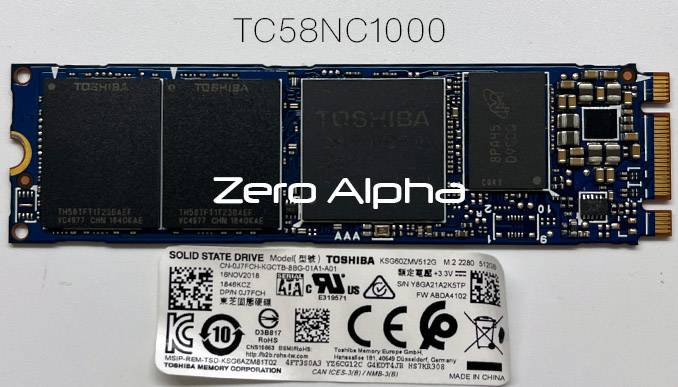Toshiba TC58NC1000 KSG60ZMV512G SSD Data Recovery
Toshiba TC58NC1000 KSG60ZMV512G data recovery service. Zero Alpha is a professional data recovery service with experience recovering from this SSD.

1. Controller Failures
The heart of an SSD is its controller, and in the Toshiba TC58NC1000 KSG60ZMV512G, failures in this component can lead to significant data recovery challenges. The controller manages data read and write processes, and when it fails, it can result in the drive becoming inaccessible. Recovery efforts are complicated by the proprietary nature of Toshiba’s controller technology, requiring specialized tools and expertise to address the failure and retrieve data.
2. Firmware Corruption
Firmware acts as the software brain of an SSD, guiding its operations. Corruption or malfunction in the firmware of the Toshiba TC58NC1000 KSG60ZMV512G can lead to a myriad of issues, such as the drive not being recognized by the system, unusual behaviors, or complete inaccessibility. Firmware corruption can be triggered by power surges, improper shutdowns, or software bugs. Recovering data from a drive with corrupted firmware often necessitates firmware reprogramming or accessing the data via specialized software tools, which can be complex and risky.
3. Physical Damage
Despite the lack of moving parts, SSDs are not immune to physical damage. The Toshiba TC58NC1000 KSG60ZMV512G can suffer from physical impacts, water exposure, or electrical damage, leading to data recovery complications. Issues such as damaged NAND chips, broken connectors, or burnt circuits can prevent the SSD from functioning. In such cases, data recovery requires delicate handling and advanced techniques, such as NAND chip-off recovery, where the memory chips are removed and read externally.
4. Bad Blocks and Wear Leveling Issues
SSDs, including the Toshiba TC58NC1000 KSG60ZMV512G, rely on NAND flash memory, which has a finite number of write cycles. Over time, this can lead to bad blocks, where sections of the memory become unreliable. The SSD’s internal wear leveling mechanisms, designed to distribute writes evenly across the memory, can also become problematic if they malfunction. Bad blocks and wear leveling issues can result in data corruption and loss, complicating the recovery process, as it becomes necessary to identify and reconstruct data from the good blocks.
5. TRIM Command Complications
The TRIM command is used to maintain SSD performance by allowing the operating system to inform the SSD which blocks of data are no longer in use and can be erased. However, this feature can pose significant challenges for data recovery on the Toshiba TC58NC1000 KSG60ZMV512G. Once TRIM has marked blocks for deletion, recovering data from those blocks becomes extremely difficult, if not impossible. This complicates efforts to recover deleted files and requires advanced recovery techniques to retrieve any remaining accessible data.
6. Power Loss Protection Failures
Many modern SSDs come with power loss protection to safeguard data in the event of a sudden power outage. The Toshiba TC58NC1000 KSG60ZMV512G is equipped with this feature, but failures can still occur. If the power loss protection fails, it can result in incomplete writes or corruption of data, leading to issues like file system corruption or a non-responsive drive. Recovering data in these cases often involves dealing with partially written data and corrupted file systems, making the process more challenging.
7. Connector and Interface Problems
The interface and connectors of an SSD are critical for data transfer. The Toshiba TC58NC1000 KSG60ZMV512G, like other SSDs, can suffer from issues related to its connectors or interface. Problems such as loose or damaged connectors, worn-out interface ports, or compatibility issues with the motherboard can lead to intermittent connectivity or complete failure in recognizing the drive. These hardware issues can complicate the recovery process, requiring precise diagnostics and repairs to establish a stable connection for data retrieval.
8. Logical Failures and File System Corruption
Even when the hardware is intact, logical failures can occur. The Toshiba TC58NC1000 KSG60ZMV512G may face problems such as file system corruption, accidental formatting, or partition loss. These issues can result in the drive being recognized but the data being inaccessible. Logical failures often require specialized recovery software to reconstruct and retrieve data from the corrupted or lost file systems, adding another layer of complexity to the recovery process.
KSG60ZMV512G Data Recovery Case Log
08Jul24: This ssd needs formatted data recovery requiring our lab to bypass trim. No safe mode shorting points were discovered.